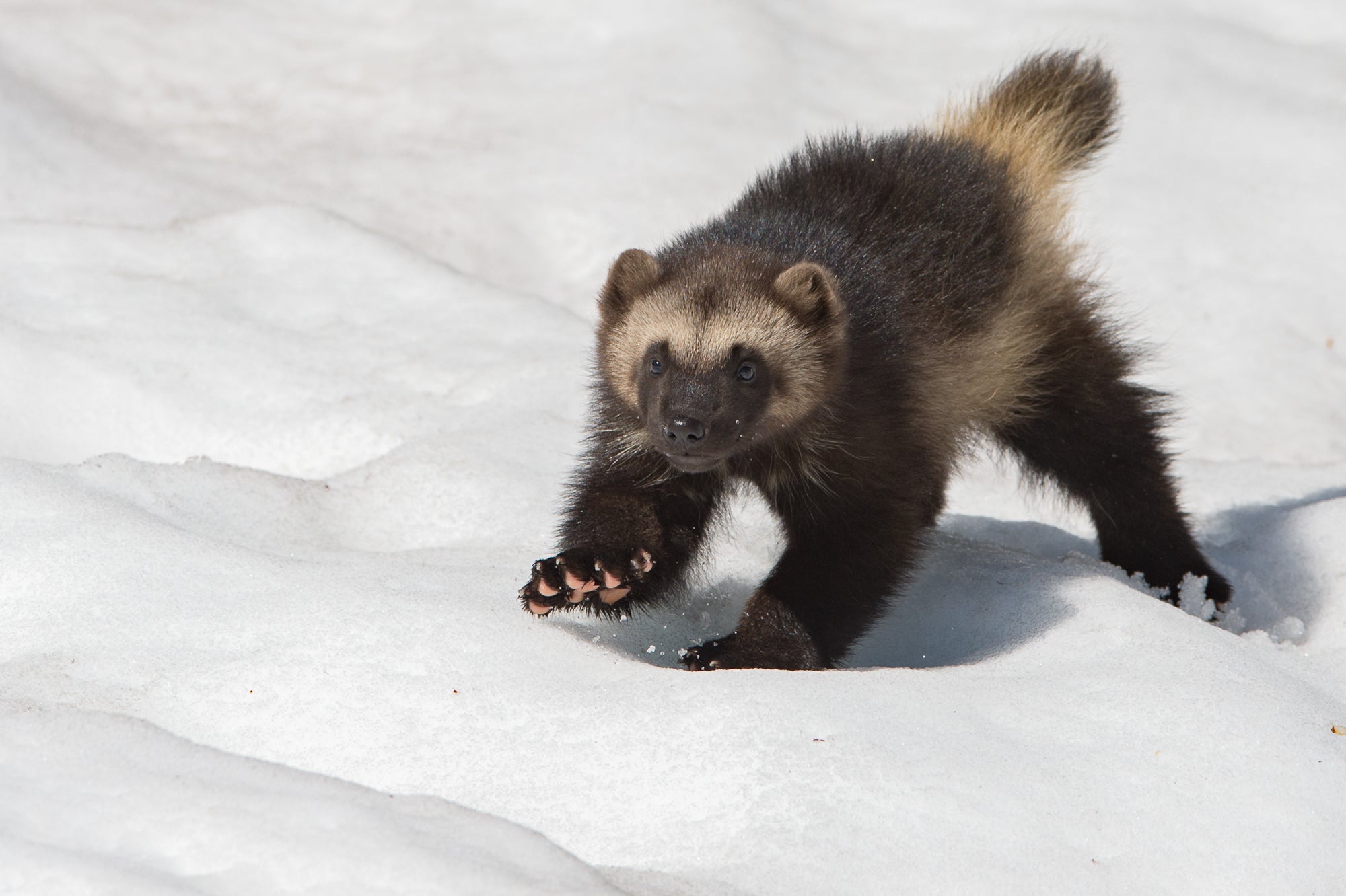Wolverine Receives Much-Needed Endangered Species Act Protections
Victory
—Fish and Wildlife Service to list species as threatened following decades of litigation
Contact
The U.S. Fish and Wildlife Service announced today that it will protect the wolverine population in the lower 48 states as threatened under the Endangered Species Act (ESA), a decision that will provide this rare wilderness species with new legal protections and programs for recovery.
The decision represents the culmination of a campaign by conservationists over decades that required six rounds of successful litigation to secure federal protections. Most recently, conservation groups succeeded in 2022 in persuading a federal judge to vacate a 2020 decision by the service denying ESA protections for wolverines in the lower 48 states. That victory sent the agency back to the drawing board to reconsider its determination and set the stage for today’s listing decision.
“This long-awaited decision gives the wolverine a fighting chance at survival,” said Timothy Preso, an Earthjustice attorney who represented conservation groups in the long-running legal campaign to protect the wolverine. “There is now hope for this icon of our remaining wilderness.”
Conservation groups originally petitioned to list the wolverine as threatened under the act in 1994 and again in 2000. For decades, the service repeatedly delayed and obstructed the proposed wolverine listing, forcing wolverine advocates to turn to the courts for enforcement of the act. Earthjustice and the groups it represents won every case they filed on behalf of the wolverine, either through judicial rulings in their favor or through favorable settlement agreements.
“The decision today gives a boost to struggling wolverines across the west,” said Dave Werntz, senior science and conservation director at Conservation Northwest. “The future for wolverines in the North Cascades and elsewhere is now much brighter.”
“The science is clear: snowpack-dependent species like the wolverine are facing an increasingly uncertain future under a warming climate,” said Michael Saul, Defenders of Wildlife Rockies and plains program director. “The protections that come with Endangered Species Act listing increase the chance that our children will continue to share the mountains with these elusive and fascinating carnivores. Now it’s time to support the species’ future by bringing them back to the mountains of Colorado as well.”
Today’s decision provides the wolverine and its remaining habitat with additional protections to ensure its best chance for survival. The wolverine, the largest terrestrial member of the weasel family, is threatened with massive habitat loss due to climate change. Wolverines depend on areas with deep snow through late spring. Pregnant females dig their dens into this snowpack to birth and raise their young. Scientists estimate that no more than 300 wolverines remain in the lower 48 states.
“I’m thrilled that the Fish and Wildlife Service finally followed the science and granted wolverines the federal protections they need to survive and recover,” said Andrea Zaccardi, the Center for Biological Diversity’s carnivore conservation legal director. “Like so many other species, wolverines waited far too long for federal protections, but I’m overjoyed that they’re finally on the path to recovery.”
“Today’s decision makes it clear that we need to protect wolverines from climate change. The best way to do that is to bring wolverines back to Colorado. As the climate changes, Colorado’s high elevation mountains are expected to stay snowier and colder than other places where wolverines live,” said Megan Mueller, conservation biologist for Rocky Mountain Wild. “We need to act now to restore wolverines to Colorado to give them a refuge from climate change.”
Wolverines once roamed across the northern tier of the United States and as far south as New Mexico in the Rockies and Southern California in the Sierra Nevada range. After more than a century of trapping and habitat loss, wolverines in the lower 48 today exist only as small, fragmented populations in Idaho, Montana, Washington, Wyoming, and northeast Oregon.
Wolverine populations are also at risk from traps, human disturbance, habitat fragmentation, and extremely low population numbers resulting in low genetic diversity. Conservation groups have warned that without new conservation efforts the dangers faced by wolverines threaten remaining populations with localized extinctions and inbreeding.
“Wolverines have been completely driven out of the Klamath Mountains where they once roamed, this is an important step to ensure that they are not driven off the planet,” said George Sexton, conservation director for Klamath-Siskiyou Wildlands Center.
“Biologists estimate a loss of more than 40% of suitable wolverine habitat in Idaho by 2060 if we fail to act,” said Jeff Abrams, wildlife program associate for the Idaho Conservation League. “This decision allows us to move forward on recovery actions to prevent such extensive loss of wolverine habitat and recover wolverine populations.”
“With only a few hundred remaining in the entire lower 48 states, Endangered Species Act protections are critical to recovering the wolverine,” said Bonnie Rice, national wildlife campaign manager for Sierra Club. “Today’s decision gives this amazing, snow-dependent species a long-overdue lifeline in the face of massive habitat loss due to climate change.”
Earthjustice represented a broad coalition of conservation groups in the most recent suit to protect the wolverine — the Center for Biological Diversity, Conservation Northwest, Defenders of Wildlife, Friends of the Clearwater, Idaho Conservation League, Jackson Hole Conservation Alliance, Klamath-Siskiyou Wildlands Center, Greater Yellowstone Coalition, Sierra Club, and Rocky Mountain Wild.

Additional Resources
About Earthjustice
Earthjustice is the premier nonprofit environmental law organization. We wield the power of law and the strength of partnership to protect people's health, to preserve magnificent places and wildlife, to advance clean energy, and to combat climate change. We are here because the earth needs a good lawyer.